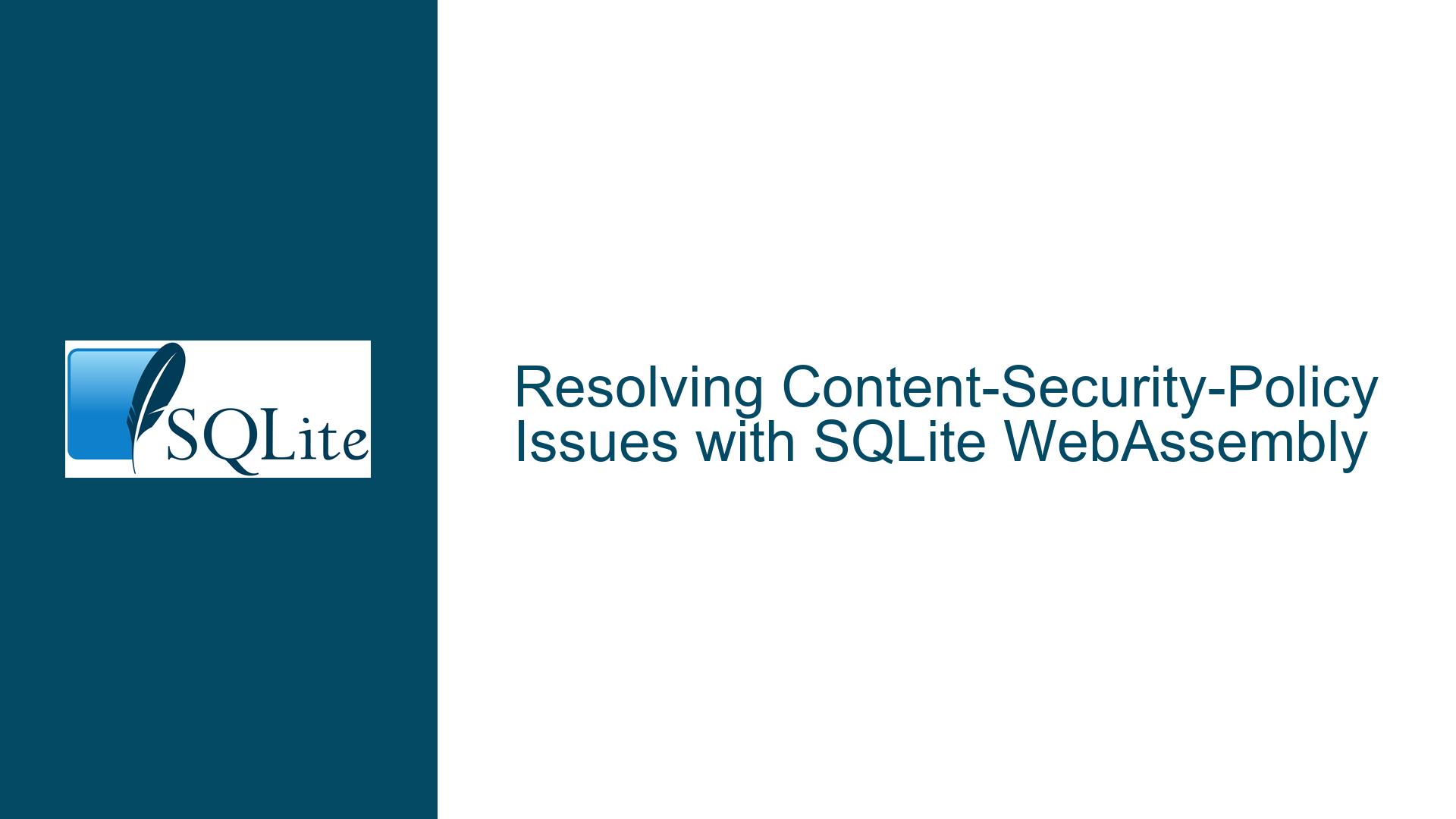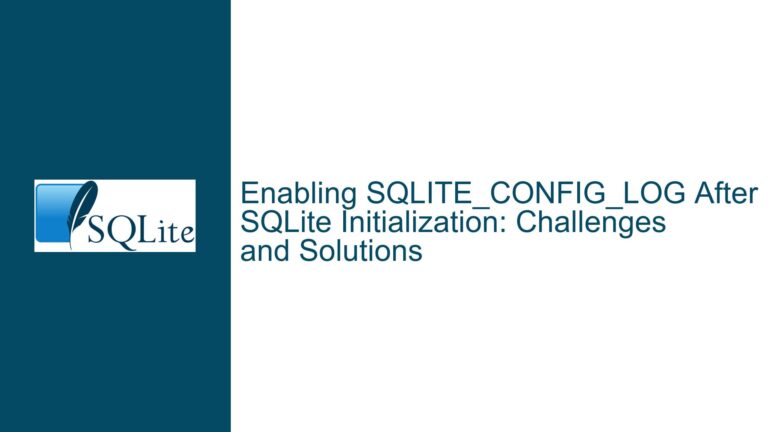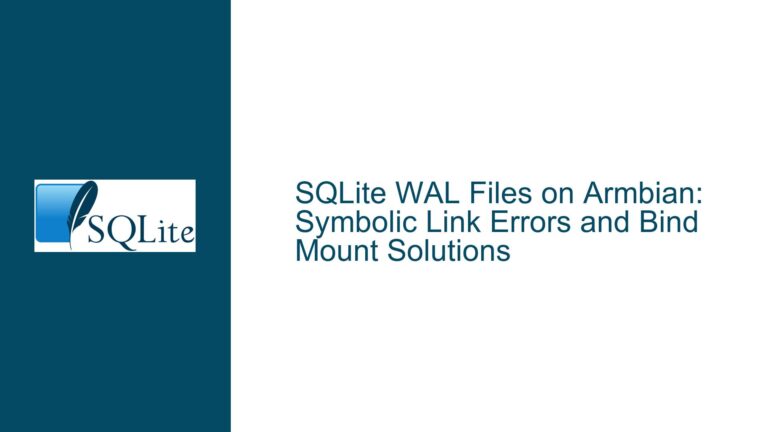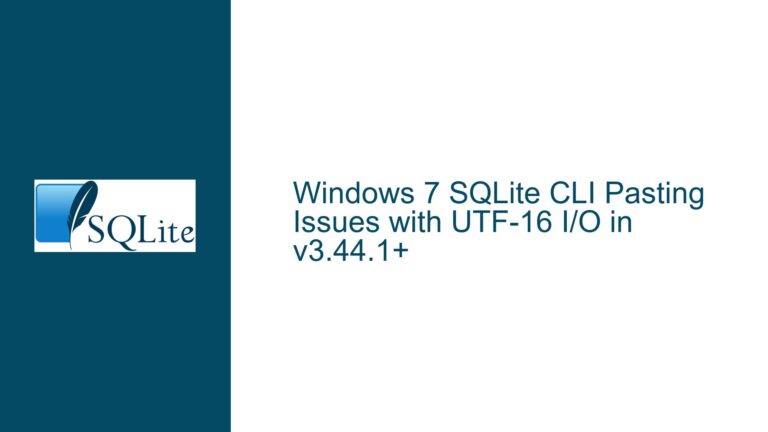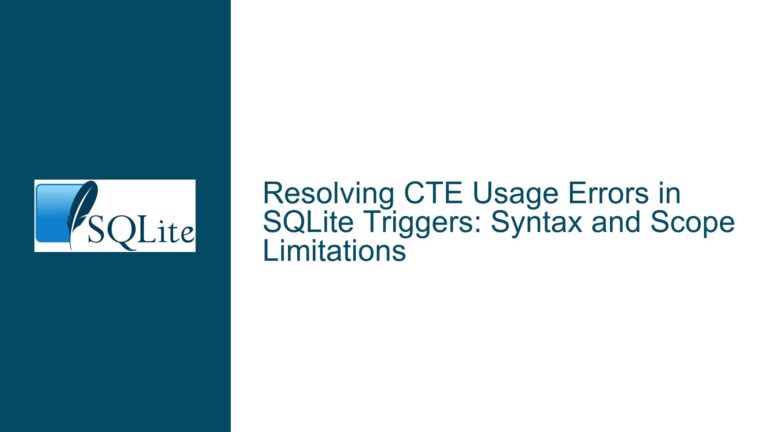Resolving Content-Security-Policy Issues with SQLite WebAssembly
Understanding the Content-Security-Policy (CSP) and WebAssembly Interaction
The core issue revolves around the integration of SQLite’s WebAssembly (WASM) module within a web application that enforces a strict Content-Security-Policy (CSP). The CSP is a critical security feature that helps prevent various types of attacks, such as Cross-Site Scripting (XSS) and data injection attacks, by controlling which resources (like scripts, styles, and WASM modules) can be loaded and executed on a web page. The challenge arises when the CSP is so restrictive that it blocks the execution of the SQLite WASM module, which requires the 'wasm-unsafe-eval' directive to function properly.
The CSP in question is configured to allow only resources from the same origin ('self'), block all mixed content, restrict the base URI to the same origin, and disallow the embedding of the page in frames (frame-ancestors 'none'). However, the SQLite WASM module requires the 'wasm-unsafe-eval' directive to be added to the script-src directive, which allows the execution of WebAssembly code that is dynamically generated or evaluated at runtime. This requirement conflicts with the security policies that prohibit the use of -unsafe- directives without additional security measures, such as nonces or SHA-256 hashes.
The primary concern is that the WebAssembly API does not currently support the use of SHA-256 hashes or nonces for WASM modules, which means that the only way to allow the SQLite WASM module to execute is to add the 'wasm-unsafe-eval' directive to the CSP. This creates a security dilemma, as the use of -unsafe- directives can potentially expose the application to security vulnerabilities.
Exploring the Root Causes of the CSP and WASM Conflict
The conflict between the CSP and the SQLite WASM module stems from the way WebAssembly code is executed in the browser. WebAssembly is designed to be a low-level, high-performance compilation target for languages like C and C++, and it allows for the execution of code that is compiled to a binary format. However, this binary format is not inherently secure, and the execution of WebAssembly code can potentially introduce security risks if not properly controlled.
The 'wasm-unsafe-eval' directive is required because the SQLite WASM module dynamically generates and evaluates WebAssembly code at runtime. This is necessary for features like binding user-defined JavaScript functions to SQLite’s C-level code, which requires the compilation of small snippets of WASM code on the fly. This dynamic compilation process is what triggers the need for the 'wasm-unsafe-eval' directive, as it involves the evaluation of code that is not pre-compiled and therefore cannot be verified by the CSP using a SHA-256 hash or nonce.
The issue is further complicated by the fact that the WebAssembly API does not currently provide a way to associate a SHA-256 hash or nonce with a WASM module. This means that even if the WASM module is loaded from the same origin, the CSP cannot verify its integrity, and the 'wasm-unsafe-eval' directive is required to allow its execution. This limitation is a result of the design of the WebAssembly API, which treats WASM modules as opaque binary blobs that do not have any associated metadata, such as a hash or nonce, that can be used for verification.
Step-by-Step Troubleshooting and Solutions for CSP and WASM Integration
To resolve the conflict between the CSP and the SQLite WASM module, several approaches can be considered. Each approach has its own trade-offs in terms of security, complexity, and compatibility, and the best solution will depend on the specific requirements and constraints of the application.
1. Relaxing the CSP to Allow 'wasm-unsafe-eval' for Specific Workers
One possible solution is to relax the CSP to allow the 'wasm-unsafe-eval' directive, but only for specific workers that load and execute the SQLite WASM module. This approach involves configuring the CSP to include the 'wasm-unsafe-eval' directive for the worker script that loads the WASM module, while maintaining a stricter CSP for the rest of the application.
For example, the CSP can be configured as follows:
let csp = "default-src 'self'; style-src 'self' 'unsafe-inline'";
if (context.path.endsWith('demo-worker.js')) {
csp = [
"default-src 'self'",
"script-src 'self' 'wasm-unsafe-eval' 'sha256-RFWPLDbv2BY+rCkDzsE+0fr8ylGr2R2faWMhq4lfEQc='",
].join('; ');
}
context.set('Content-Security-Policy', csp);
In this configuration, the 'wasm-unsafe-eval' directive is only applied to the worker script that loads the WASM module, and a SHA-256 hash is included to satisfy the security policy. This approach allows the SQLite WASM module to execute while minimizing the potential security risks associated with the 'wasm-unsafe-eval' directive.
2. Using a Non-Streaming WebAssembly API
Another approach is to use the non-streaming WebAssembly API, which does not require the 'wasm-unsafe-eval' directive. The non-streaming API allows for the loading and instantiation of WebAssembly modules from a binary buffer, which can be fetched from the same origin without triggering the CSP restrictions.
For example, the WebAssembly module can be loaded and instantiated as follows:
fetch('sqlite3.wasm')
.then(response => response.arrayBuffer())
.then(buffer => WebAssembly.instantiate(buffer, imports))
.then(instance => {
// Use the WebAssembly instance
});
This approach avoids the need for the 'wasm-unsafe-eval' directive, as the WebAssembly module is loaded from a binary buffer rather than being dynamically compiled at runtime. However, this approach may not be suitable for all use cases, as it requires the WebAssembly module to be pre-compiled and does not support dynamic compilation of code.
3. Implementing a Custom Security Policy for WebAssembly
A more advanced solution is to implement a custom security policy for WebAssembly that allows for the verification of WASM modules using SHA-256 hashes or nonces. This approach involves extending the WebAssembly API to support the association of metadata, such as a hash or nonce, with a WASM module, and modifying the CSP to verify the integrity of the module based on this metadata.
For example, the WebAssembly API could be extended to include a new method for loading and verifying a WASM module:
WebAssembly.verifyModule(buffer, hash)
.then(module => WebAssembly.instantiate(module, imports))
.then(instance => {
// Use the WebAssembly instance
});
In this approach, the verifyModule method would verify the integrity of the WASM module by comparing its SHA-256 hash to the provided hash, and only instantiate the module if the hashes match. This approach would allow the CSP to enforce a strict security policy for WebAssembly modules without requiring the use of the 'wasm-unsafe-eval' directive.
4. Advocating for Future WebAssembly and CSP Integration
Finally, it is important to advocate for future improvements to the WebAssembly API and CSP integration. The current limitations of the WebAssembly API with respect to CSP are a known issue, and there are ongoing discussions about how to address these limitations in future versions of the WebAssembly specification.
For example, there are proposals to add support for SHA-256 hashes and nonces to the WebAssembly API, which would allow the CSP to verify the integrity of WebAssembly modules without requiring the use of -unsafe- directives. These proposals are still in the early stages of development, but they represent a promising direction for resolving the conflict between CSP and WebAssembly.
In conclusion, the integration of SQLite’s WebAssembly module with a strict Content-Security-Policy presents a complex challenge that requires careful consideration of security, compatibility, and performance. By exploring the root causes of the conflict and implementing targeted solutions, it is possible to achieve a secure and efficient integration of WebAssembly and CSP in web applications.
